Did you ever think about how long solar panels last and when they start being less efficient?
Solar panels are made to last for decades. The Solar Energy Industries Association (SEIA) says they usually work for 20-30 years. Some panels can even keep going for more than 40 years. Yet, after about 25 years, they make a bit less energy. This is because the panels slowly get worse. Knowing how long your solar panels will stay good and what the warranty covers helps you use them better.
Key Takeaways
- Solar panel lifespan expectancy generally falls between 20 to 30 years.
- Superior quality panels may last beyond 40 years.
- Degradation rate causes a gradual decline in energy production over time.
- Investing in well-constructed panels ensures prolonged efficiency.
- Solar panel warranty coverage compensates for potential declines in power output.
Understanding Solar Panel Lifespan
It’s key to know how long solar panels last when thinking about solar energy investments. Usually, solar panels are built to last and work well for many years. Manufacturers often promise that their panels will still produce a good amount of power years into the future.
Industry Standards and Expectations
Most solar panels are expected to work for 25 to 30 years. But, some can even last longer. These exceptional panels have been made using top-grade materials and the latest production methods. This makes them stronger and more efficient for a longer time.
Factors Affecting Lifespan
Many things can change how long solar panels last.
- Quality of solar panel production is important. Better materials and production methods make panels last longer.
- Being out in the weather a lot can make them wear out faster. This includes hot and cold weather, heavy snow, and strong winds.
- The manufacturer’s dedication matters too. Companies that really care about quality often give strong guarantees. These guarantees promise the product will last a long time.
Getting to know these factors early on is really important for your solar investment. It’s all about choosing the best panels that will keep performing well for many years.
Solar Panel Degradation Rate
Solar panels lose some performance over time. This happens because of many reasons. Knowing how fast they can change and what affects them is key. The National Renewable Energy Laboratory has done studies on this.
Average Degradation Rates
As per the NREL, solar panels lose about 0.5% of their ability each year. This is like losing 5 dollars from a 100-dollar bill each year. Over 20 years, they become about 10% less effective. So, a solar panel set that started out at 100% will drop to 90% after 20 years.
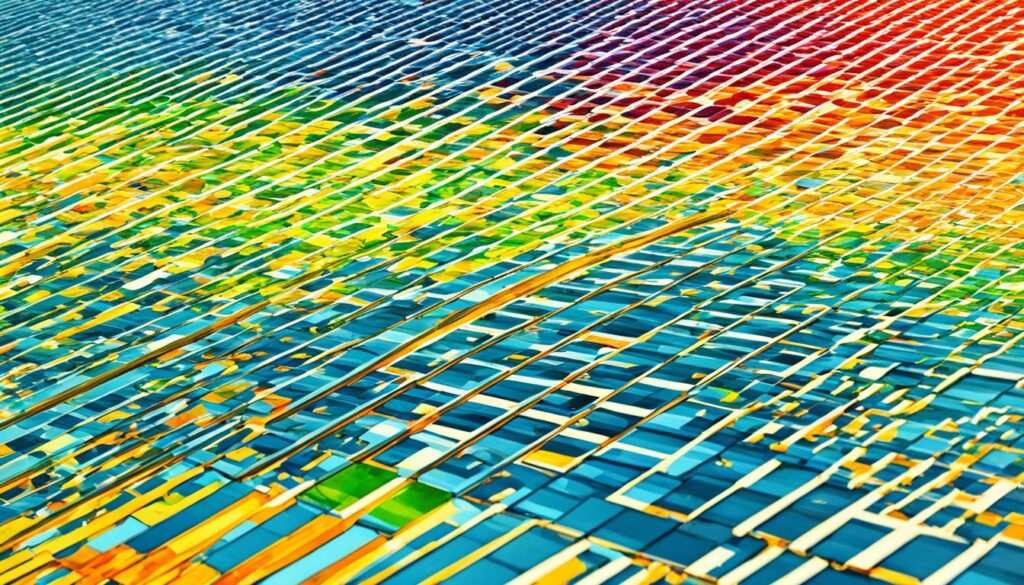
Factors Influencing Degradation
Many things can make solar panels worse over time. This includes super hot or freezing conditions, physical stress, and heavy weather. Poor upkeep and low-quality materials also speed up how fast they deteriorate. So, picking top-tier panels and caring for them well can make them last longer and work better.
The Impact of Quality on Solar Longevity
This is how long a solar panel lasts depends a lot on its quality. The Bloomberg New Energy Finance Corporation (BNEF) says you can tell a good panel based on its “tier.” These tiers show if a panel will last longer and produce more energy.
Tier One vs. Tier Two and Three
Solar panels in the top tier are from big, trusted companies. The BNEF says they are made really well and are always reliable. Panels in the second and third tiers might not be as good. They might not last as long or work as well because they haven’t gone through the same strict checks.
| Aspect | Tier One | Tier Two and Three |
|---|---|---|
| Manufacturers | BNEF Recognized | Less Established |
| Degradation Rate | Lower | Higher |
| Energy Output | High | Variable |
| Standards | Stringent | Moderate to Low |
The Role of Manufacturing Standards
How well a solar panel is made affects how long it lasts and how much energy it makes. Good panels are made very carefully to be tough and work well for years. But, if a panel isn’t in the top tier, it might not be as reliable over time because it doesn’t meet these high standards.
Buying solar panels from well-known, high-quality makers is smart. The BNEF marks these manufacturers as top-tier. This means you get more energy for longer, keeping your investment safe.
What is the Lifespan of a Solar Panel?
Investing in a solar energy system means looking past the start-up expenses. It’s key to know how long solar panels last, especially in photovoltaic (PV) technology. With a strong power production guarantee, they give steady energy for many years.
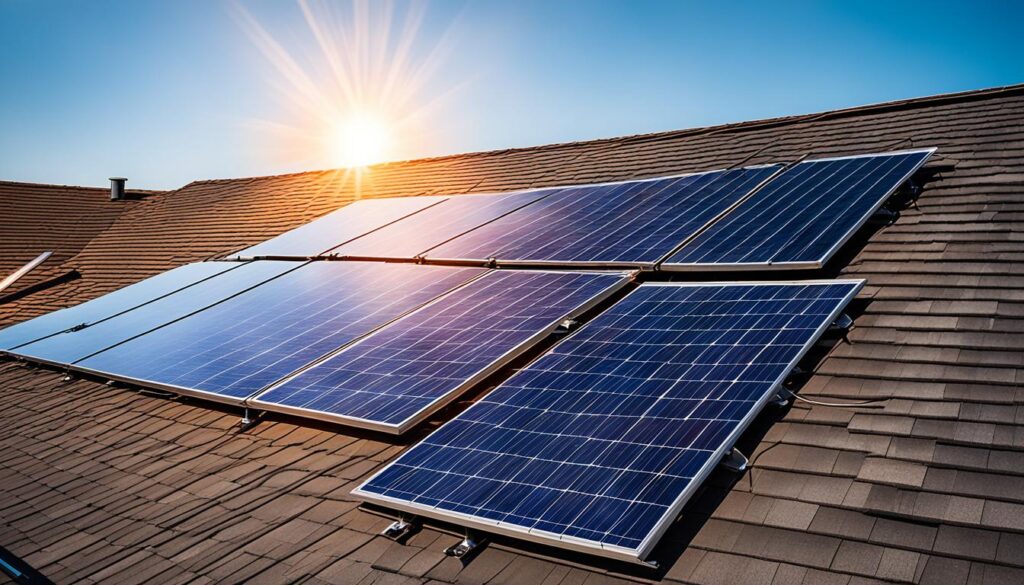
To make a wise solar energy system investment, knowing a solar panel’s lifetime is vital. Thanks to photovoltaic (PV) technology, good quality panels can last a long time. This boosts both eco-friendliness and the money you save.
Most brands offer a power production guarantee to keep the solar panel working well for years. Photovoltaic (PV) technology helps improve the panel’s performance and toughness. This way, you get a big benefit from your solar energy system investment.
Choosing panels with strong warranties and power production guarantees is very important. It helps keep your solar energy system effective for a long time. This also makes your energy system more sustainable overall.
The Importance of Proper Installation
Getting your solar system installed right is key to making it last and work well over time. It’s very important to have it installed carefully and correctly. This can make a big difference in how your system works for many years. So, it’s best to let *experienced solar installers* handle the job.
Choosing a Reputable Installer
Picking the right solar panel installation expert is crucial. It’s wise to look for someone with a good reputation and the right qualifications. Check what others say about their work. Make sure they have the right certificates and look at their past jobs. A workmanship warranty from a reliable company can help you feel confident about your installation.
Ensuring Reliable Racking Systems
Strong and dependable racking systems are a must for solar panel installation success. These racks hold the panels firmly in place through all types of weather for many years. Choosing quality racking helps keep your solar panels secure and working their best. This prevents damage and ensures top performance.
In short, it pays to go for the best when it comes to solar panel installation. Let *experienced solar installers* do the job. Also, make sure you have a strong racking system and a good workmanship warranty. These steps are essential for getting the most out of your solar system.
Regular Maintenance Tips
Making sure your solar panel system works well for a long time needs regular maintenance. This maintenance keeps the system generating solar energy efficiently. It also makes the system last longer with fewer drops in performance. Follow key solar panel maintenance tips for the best results and a longer life from your system.
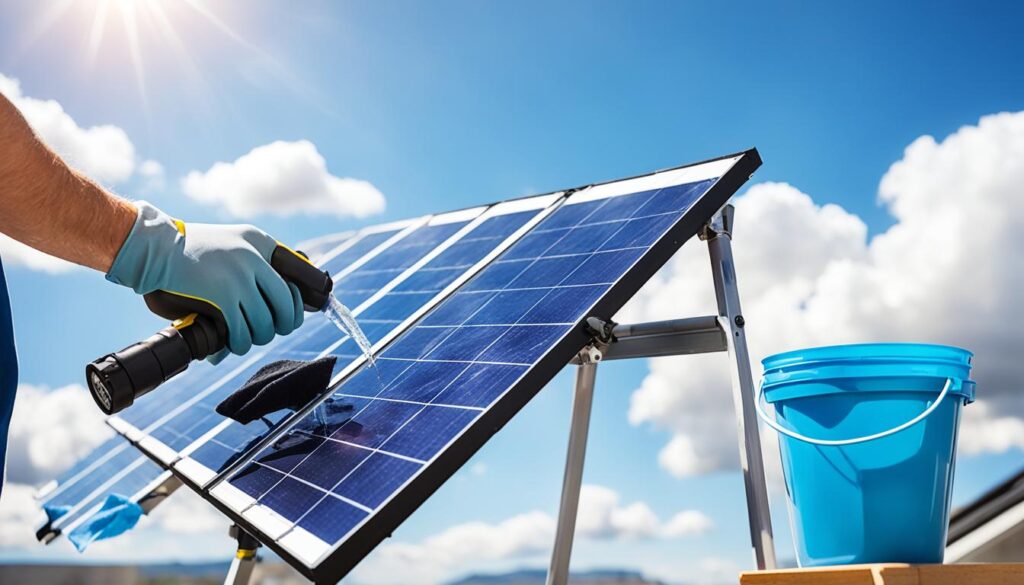
Cleaning and Upkeep
Regularly cleaning your solar panels is crucial. They can get covered in dirt, dust, leaves, and more, which lowers how much sunlight they absorb. Use water and a soft sponge to clean them and avoid using strong abrasives. This way, your system will collect as much sunlight as possible. If you have many birds around, check for droppings often. These can also lower your solar energy generation.
Professional Maintenance Checks
Beyond just cleaning, having pros check your system is critical. They do detailed inspections to ensure everything works well. This includes checking parts like inverters and mounts. Getting these inspections can find issues early, helping to keep your solar panel system working great for years.
| Maintenance Task | Frequency |
|---|---|
| Surface Cleaning | Every 3-6 Months |
| Professional Inspection | Annually |
| Inverter Check | Every 6 Months |
| Racking Mount Inspection | Annually |
Keep up with these solar panel maintenance tips to make your solar system last and work well. Doing your own checks and getting professional inspections as well ensures top performance. This maintenance routine will pay off, making your solar investment worth it in the long run.
How Weather Conditions Affect Solar Panels
The weather has a big impact on how well solar panels work and how long they last. They can be affected by everything from hot sun to severe storms. These elements can change how efficient solar panels are and how quickly they wear down.
Solar panel climate impact is a big deal. High heat, for example, can make the panel materials move too much. This can create small cracks and make the panel produce less electricity over time.
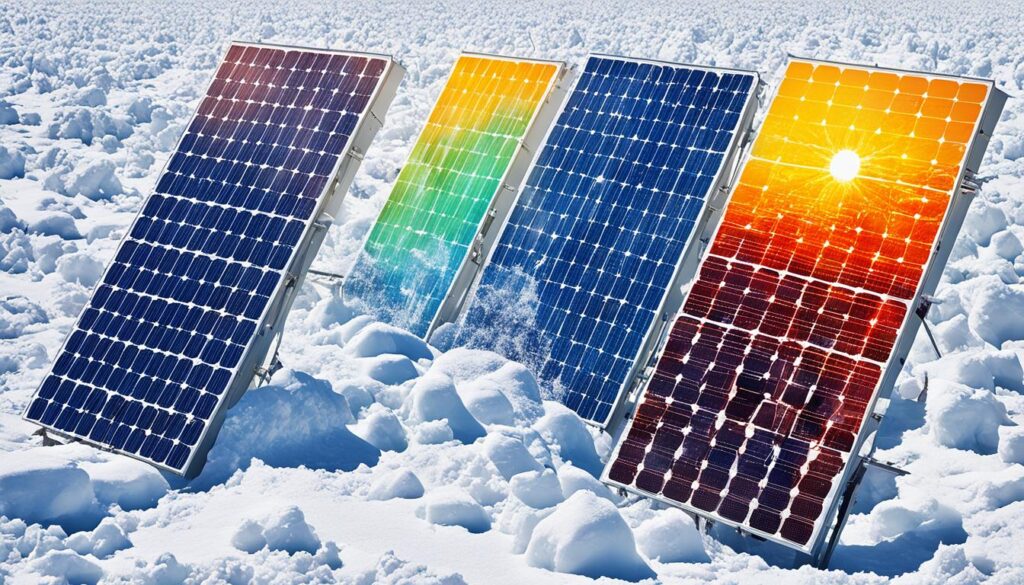
Bad weather like hail, heavy snow, and strong winds is also a problem. Hail can break the panel’s surface, and strong wind can knock panels off their support. To protect against these issues, solar panels need strong defenses.
Moisture in the air, or humidity, is another challenge. It can cause the electrical parts to corrode and the panel layers to separate. Places by the sea have it worse because the salt makes these problems happen even faster.
| Weather Condition | Potential Impact | Preventive Measures |
|---|---|---|
| High Temperatures | Thermal Cycling, Micro-cracking | Heat-resistant Materials, Improved Ventilation |
| Hail | Surface Cracking, Shattering | Impact-resistant Glass, Protective Covers |
| Strong Winds | Dislodgement, Structural Strain | Secure Mounting, Wind-resistant Design |
| Humidity | Corrosion, Delamination | Anti-corrosive Coatings, Proper Sealing |
Knowing how the environment affects solar panels helps prepare for weather risks. By using the right materials and designs, the impact of the solar panel climate can be lessened. This helps solar panels last longer and work better in different places.
For solar panels to last, they need regular checks and care, especially in stormy areas. Good protection and planning are key to making solar panels resilient against weather and last for many years.
Long-term Use and Replacement Considerations
Solar panels show signs when they’re reaching the end of their life. When you see these signs, it might be time to replace them. This keeps your energy production efficient and protects your solar investment.
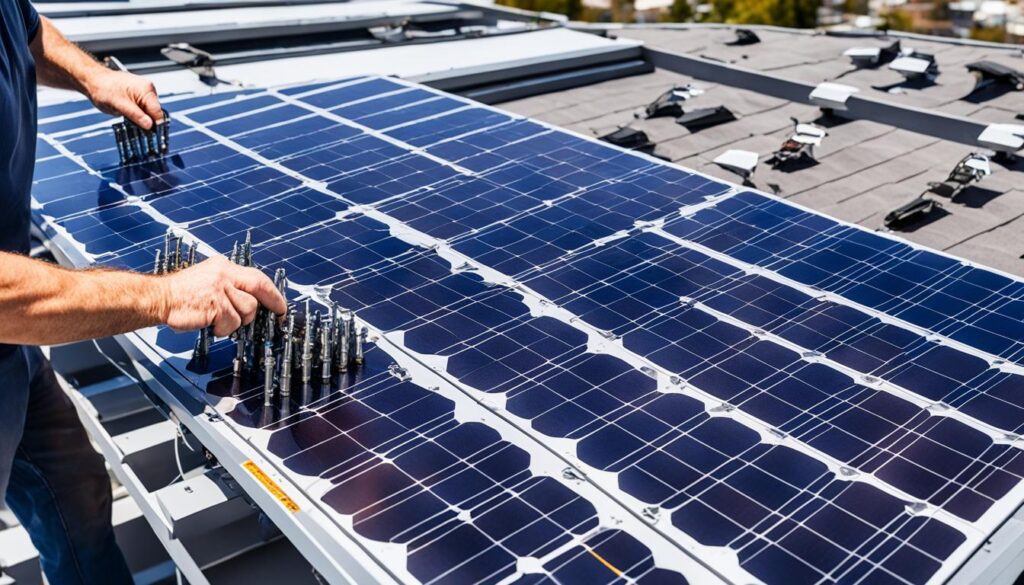
Signs Your Panels Need Replacement
Knowing when to replace your solar panels is important. Look for a big drop in energy output or any physical damage. If they keep underperforming in great conditions, you should check their efficiency. Maybe it’s time for them to be replaced for better productivity.
Maximizing Your Investment
Long-term solar investment is more than just the start. It involves taking steps to keep the system working well. Choose high-quality panels with long warranties for a good return on investment. Doing regular maintenance and checking for problems early can stop big drops in energy efficiency. Always make sure your panels are under a good warranty to protect your energy source.
Conclusion
Choosing solar energy is more than a decision for now. It’s an investment that shapes our future. Knowing how long solar panels last and their maintenance needs helps get the most out of them. This means our solar power will stay efficient for years.
Good quality solar panels, when carefully installed and maintained, last longer. They work well even when the weather changes. By focusing on these aspects, we can ensure our solar system is reliable and efficient. It benefits both our planet and our wallets.
Solar energy is a step towards a more sustainable tomorrow. It offers more than saving money. It gives us independence from traditional energy and lowers our carbon footprint. With care, solar panels will be a good energy choice for the future.
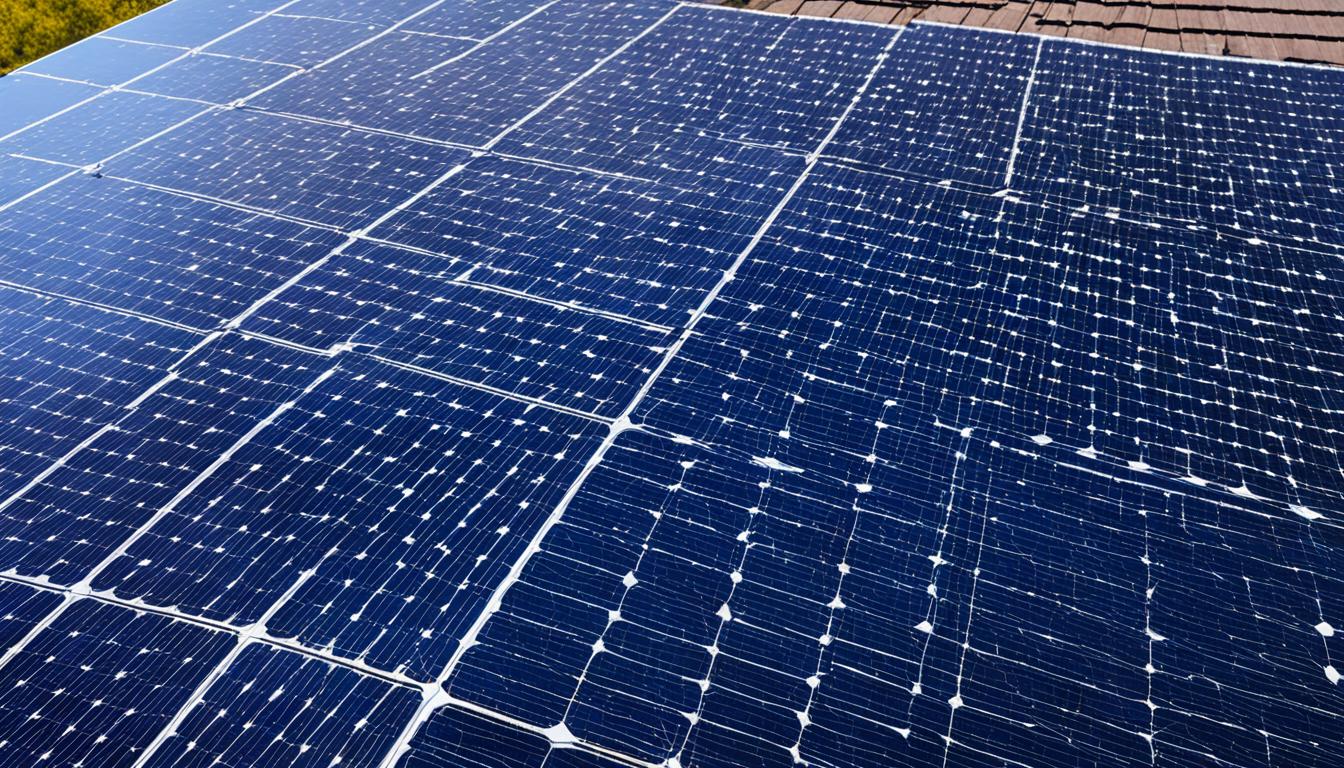



Interesting read, but dont you think its a bit optimistic to claim a 25-30 year lifespan for solar panels? In my experience, performance dips significantly after 15 years. Plus, the industry standards seem to be more of a marketing gimmick. Are they really considering all the varying weather conditions worldwide? Doubtful. We need a more realistic approach.
Interesting read, but Im curious about something. Could our focus on solar panel lifespan be diverting us from exploring newer, potentially better renewable energy options? I mean, arent we sticking to good enough instead of striving for breakthroughs? Just a thought.
Im curious if advancements in solar panel technology could potentially increase their lifespan beyond current industry standards. Imagine if our panels could last a lifetime! 🌞 #SolarPowerRevolution
I find it fascinating how technology evolves! Who wouldve thought solar panels have a lifespan? Definitely makes you think about sustainability and innovation. Cant wait to see what the future holds!
I find it fascinating how industry standards play a role in determining the lifespan of solar panels. Who knew there were so many factors at play? Definitely something to consider when investing in renewable energy.
I cant believe solar panels only last 25-30 years! Do you think advancements in technology will increase their lifespan in the future? Lets discuss! 🌞🔋 #RenewableEnergyDebates
Interesting read. But, wouldnt the lifespan of a solar panel also depend on the quality control of the manufacturing process? Not all models are built equal, right?
Interesting read, but are there any studies on the impact of extreme weather conditions on solar panel lifespan? Talking specifically about hailstorms or hurricanes. Would that significantly reduce their lifespan?
Interesting read! But shouldnt we be focusing more on devising ways to recycle or repurpose old panels, rather than just discussing their lifespan? Sustainability isnt just about using renewables, but also managing waste effectively.
Interesting article, but isnt it ironic were talking about the lifespan of solar panels but not the energy and resources it takes to produce them? Are they really that green? Just a thought.
Interesting read but dont you think we focus too much on solar panel lifespan rather than their efficiency over time? Isnt it more about the output than how long they last? Just food for thought.
Anyone know if solar panels lifespan increases with regular maintenance or is it just a fixed industry standard?
Interesting read! But are there any significant changes in lifespan for solar panels installed in harsher climates?
Interesting read, but what about the environmental impact of disposing old panels? Is recycling them viable?
Interesting read but dont you think we should focus more on recycling solar panels rather than their lifespan? Just a thought!
Interesting read, but does the lifespan of solar panels decrease over time due to constant exposure to sunlight? Seems counterintuitive, but plausible.
Great read! But can someone explain how climate or geographical location impacts a solar panels lifespan?